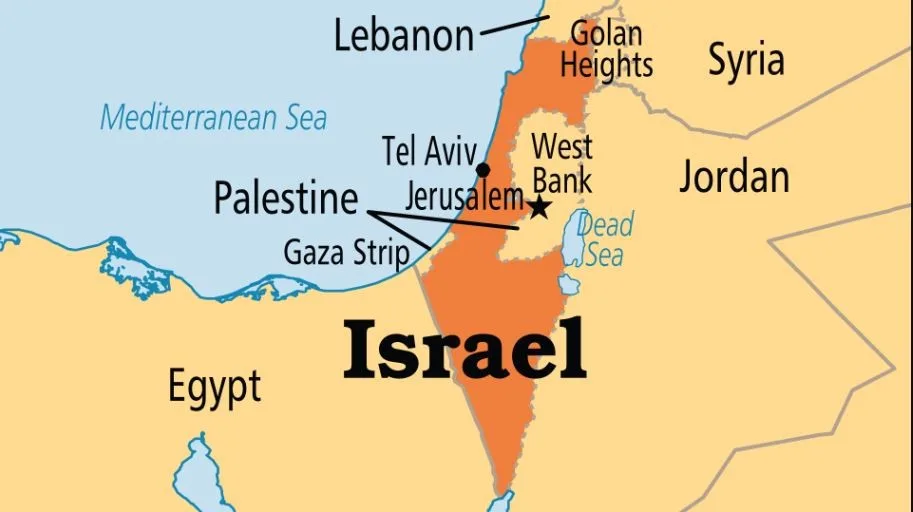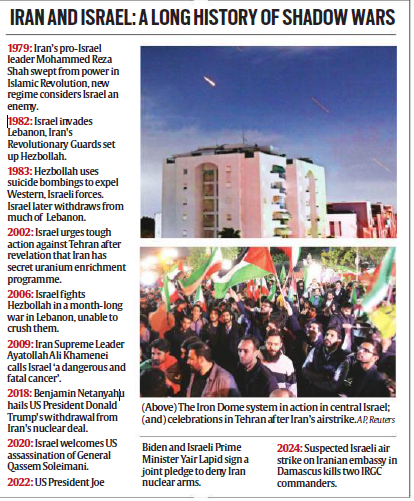Syllabus: GS2/IR
Context
- Tensions in West Asia have spiked after pagers and hand-held radios exploded in attacks across Lebanon and parts of Syria.
- Hezbollah, the Iranian-backed Lebanese political party and militant group, has accused Israel of carrying out the attacks, which the Israelis have neither owned nor disowned.
Gaza War
- After the Palestinian militant group Hamas attacked southern Israel last year, Israel launched its massive retaliation, in which more than 41,000 Palestinians have been killed in Gaza so far.
- After 11 months of airstrikes and ground operations, about 100 hostages remain in Hamas captivity.
- Throughout this period, Hezbollah has engaged Israel through shelling and rocket fire along its northern border, leading to the displacement of Israelis.

Timeline of the Iran-Israel Conflict

Future Course of the War
- A statement from Prime Minister Benjamin Netanyahu’s office strongly suggested the possibility of expanding military operations to get Hezbollah to stop firing at Israeli targets.
- There are several scenarios possible over the next few weeks.
- There could be a repeat of the attack when Iran launched a wave of aerial strikes on targets in Israel, though with limited impact.
- Iran could coordinate with its partners in the so-called Axis of Resistance — Hamas, Hezbollah and the Houthis — to carry out attacks on Israel.
- Israel, on its part, could carry out an aerial offensive against not just Hezbollah but also the Lebanese state apparatus.
Concerns for India
- Threat to Indian Community: There are about 18,000 Indians in Israel and about 5,000-10,000 Indians in Iran, about 90 lakh people are living and working in the Gulf and West Asia region.
- Any conflict that expands will end up posing a risk to the Indian community that is based in the region.
- Energy Security: The West Asia region contributes to India’s 80 percent of oil supplies, which a potential conflict will impact.
- India has been able to minimise the impact of oil prices due to the Russia-Ukraine war by buying Russian oil at discounted prices, but this conflict will have an adverse impact on energy prices.
- Investment and Strategic Importance: India has invested in a strategic relationship with major Arab countries, Iran, and Israel.
- India sees the region as its extended neighbourhood, and it has been pushing for the India-Middle-East-Europe Economic corridor, which has strategic as well as economic benefits.
- Chabahar in Iran is another strategic economic project, which acts as a gateway to Afghanistan and Central Asia — since Pakistan denies land transit to Indian goods.
- Any conflict in the region, and the implementation of any US sanctions will also impact India’s plans for Chabahar port.
- In addition, the India-Israel-UAE-US I2U2 initiative and plans to connect Indian cargo routes through the International North South Transport Corridor (INSTC) to Russia could be affected.
- Defence Relations with Israel: India has a very deep strategic relationship with Israel, especially in the context of defence and security partnership.
India’s Stand
- Maintaining a Balanced Stand: India’s stakes in the bilateral relationships with both Israel and Iran are huge, India will expect both the countries to avoid military actions that will trigger a dangerous and wider war in the region.
- Based on the Complex Regional Politics: Inter-state and intra-state conflicts in the Middle East are deep and pervasive, and India will have to forever balance its engagement with key regional actors — Egypt, Iran, Israel, Qatar, Turkey, Saudi Arabia, and the United Arab Emirates — whose orientation and interests are different and often in conflict.
- India’s call for de-escalation between Israel and Iran is about recognising the complexity of the region’s politics.
- Non- Ideological Engagement: The non-ideological engagement with the region is a necessary complement to India’s expanding interests in the Middle East.
- India’s interests in the region are no longer limited to oil imports and labour exports.
- The Gulf Arab states — especially Saudi Arabia and the United Arab Emirates — have emerged as major economic and political partners for India.
Way Ahead
- India has so far made no statements on the volatile situation in the region. In April, after the Iranian attack on Israel, India had expressed “serious concern” at the escalation of hostilities, and called for “immediate de-escalation”.
- India has strategic ties with both Iran and Israel — and for decades, it has been able to balance between the two sides. But if the conflict widens, it would be difficult for it to maintain an ambivalent position.
- In the context of such deep ties with both Israel and Iran, India has difficulty in choosing sides.
- India’s position that there should be “immediate de-escalation” and “step back from violence” and “return to the path of diplomacy” is, therefore, crucial to its national interest.
Source: IE
Previous article
Bombay HC Struck Down Fact Check Unit
Next article
FATF Lauds India’s Efforts to Tackle Illicit Finance